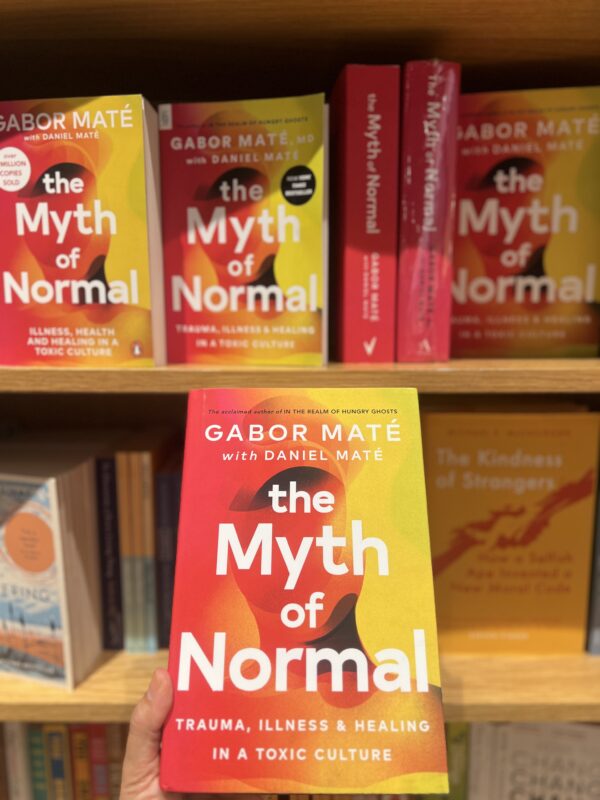
Novel and Psychotherapy
“People always meet each other at the same level of emotional growth (development) or trauma recovery (resolution). This means they find someone who matches their level. But when one person starts growing and the other does not, it becomes impossible. Either the person that is growing gives it up and goes back to the previous level, which is almost impossible, or the other person is challenged to start growing themselves or they are going to split. That is what always happens.”
Dr. Gabor Mate
The author of “The Myth of Normal (Trauma, Illness, and Healing in a Toxic Culture)”
Other than blood ties, every acquaintance and relationship in our lives typically results from our choices to be in certain places or interact with certain individuals. Those choices are also based on our conscious and subconscious preferences and priorities in the smallest details of life. I can never consider myself a victim of the differences in understanding, social level, and cultural background of my spouse’s family members, friends, or colleagues and feeling trapped or enslaved by these relationships. Because by choosing someone as a spouse or friend, or choosing a job, I accept interactions and relationships with her/his family members and colleagues who have these characteristics. So, in that particular time and under those specific circumstances, whether mistakenly or rightly, I might have perceived myself to be on an equal footing with them as I entered into such interactions and relationships. Therefore, if after some time I realize a mistake in assessing the level, or with personal growth, the differences become apparent and bothersome to me, instead of considering myself a victim or trapped, I should seek solutions to manage relationships and take practical steps to improve the situation. Actions that can be taken in these situations, in my view, are not necessarily black and white or binary.[1] In other words, actions exist along a spectrum with unclear and intertwined boundaries. Depending on the relationships involved and the flexibility of each party in terms of change, interaction, and growth, there are various solutions available.
In the context of blood ties, the same principle applies. In relationships between parents and children, siblings, and even extended family members such as aunts, uncles, nieces, and nephews, whenever one party, usually the older individual, stagnates in their thinking, personality, and maturity, and fails to evolve in sync with the needs and preferences of younger generations and the demands of societal changes, that relationship is destined for stagnation and death or difficulties and bitterness in its continuity. So it seems that even in relationships where we had no role in their choice, the choice for change or stagnation can determine whether the continuation is healthy or toxic, or whether it ends altogether.
My lived experience across all types of relationships I’ve had confirms the initial statements of the text. Where one party in a relationship does not support the irreversible growth of the other in various aspects and instead attempts to undermine, demean, control, or devalue the person through various means, the healthy continuation of that relationship becomes unlikely.
We see this issue in the relationships between people and government as well. Where there is a disparity in growth, maturity, and development between the nation and the state, tension and conflict arise. Although one may temporarily maintain such a relationship through force, power, and wealth, ultimately this relationship will end in demise.
many thinkers and great minds have existed at a level of understanding, comprehension, personal growth, maturity, and intelligence that exceeded that of their society, yet their society could not accept them and, wielding greater power, sought to eliminate them. Ironically, these very thinkers have become the legends of science, philosophy, and art in subsequent generations of the same society, and their works have become the foundation for new scholars in modern times.
This rule is understandable in the parent-child relationship as well. A parent who does not evolve in sync with the inherent growth and upward trajectory of their child, and fails to seize this opportunity for their growth, is at best condemned to isolation. Even if during the period of their child’s incapacity and childhood, when power lies in their hands, they impose their beliefs and preferences on them completely.
Indeed, nature inherently flows and is constantly evolving and changing. Our companionship as humans with nature, including being in harmony with this flow and upward trajectory, is the best and most secure path to leading a satisfying life.[2]
[1] . By “black and white,” you mean either completely cutting off the relationship or fully committing to a person in all dimensions.
[2] . I’m not saying we should mimic nature, because as humans, we are also part of nature and a part cannot mimic the whole because it’s not separate from it. Instead, for improvement and harmony, we should align ourselves and accompany it.
آدمها همیشه در سطح یکسانی از رشد عاطفی یا بهبودی تروما با هم ملاقات میکنند
به نام خدای مهربون
“آدمها همیشه در سطح یکسانی از رشد عاطفی یا بهبودی تروما با هم ملاقات میکنند، یعنی شخصی را پیدا میکنند که با سطح خودشان جور باشد، ولی زمانی که یک نفر شروع میکند به رشد کردن و دیگری رشد نمیکند، رابطه غیرممکن میشود. یا اونی که رشد کرده پسرفت میکند و برمیگردد به همان سطح قبلی که تقریبا غیرممکن است، یا طرف مقابل به چالش کشیدهمیشود که شروع کند به رشد کردن وگرنه از هم جدا میشوند. این اتفاقی است که همیشه میافتد.”
گابور ماته
نویسنده کتاب “افسانه عادی بودن (تروما، بیماری و درمان، در فرهنگ سمی)”
غیر از وابستگیهای خونی، هر آشنایی و ارتباطی در زندگی ما معمولن نتیجه انتخابهای ما از بودن در مکانی یا تعامل با افرادی است. آن انتخابها نیز مبتنی بر ترجیحات و اولویتهای خودآگاه و ناخودآگاه ما در جزئیترین امور زندگی است. من هیچگاه نمیتوانم از تفاوت درک و سطح اجتماعی و فرهنگی افراد خانواده همسر، دوستان و یا همکارانم نالان باشم و خود را قربانی این روابط و محصور و اسیر آنها بدانم؛ چراکه من با انتخاب فردی به عنوان همسر و دوست، یا انتخاب یک شغل، تبعن ارتباط با اعضای خانواده آن فرد و همکارانی با این ویژگیها را نیز پذیرفتهام. پس احتمالن در آن مقطع زمانی و شرایط خاص، چه به اشتباه و چه درست، خود را در سطح یکسانی با آنها میپنداشتم که وارد چنین تعامل و رابطهای شدهام. پس اگر پس از مدتی متوجه اشتباه در تشخیص سطح شدم و یا با رشد شخصیتیام، تفاوت برایم بارز و آزاردهنده شد، باید بجای قربانی و اسیر انگاشتن خود، در جستجوی راه چاره برای مدیریت روابط و اقدامی عملی برای بهبود اوضاع باشم. اقداماتی که در این موارد میتوان انجام داد، از نظر من، میتوانند لزومن صفر و یک یا سیاه و سفید نباشند. به عبارتی، اقدامات در یک طیف هستند که گاه مرزهای نامشخص و درهم تنیدهای دارند. بسته به این که روابط میان چه افرادی برقرار است و میزان انعطاف هریک از طرفین در تغییر، تعامل و رشد، چقدر است، راه حلهای مختلفی وجود دارد.
در فرض وجود وابستگیهای خونی نیز همین قاعده جاری است. در روابط میان والد و فرزند یا خواهر و برادر و حتی در روابط میان اعضای فامیل اعم از عمه و دایی و خاله و عمو و فرزنداشان، نیز هرگاه یک طرف که معمولن فرد مسنتر میباشد، در مرحلهای از تفکر، شخصیت و بلوغ متوقف شود و همگام با نیازها و سلایق نسلهای بعدی و ضروریات و تحولات جامعه تغییر نکند، این رابطه محکوم به مرگ و یا دشواری و تلخی در تداوم است. پس به نظر میرسد حتی در روابطی که ما نقشی در انتخابشان نداشتهایم نیز اختیار به تغییر یا ایستایی، تعیینکنندهی ادامهی باکیفیت یا مسموم رابطه و یا قطع آن است.
تجربه زیسته من در تمام انواع ارتباطاتی که داشتم تاییدکننده عبارات آغازین متن است. هرجا یک طرف رابطه به رشد برگشتناپذیر طرف دیگر در حوزههای مختلف تن ندهد و با توسل به شیوههای متعدد درصدد تخریب، تحقیر، کنترل و بیارزش کردن فرد برآید، تداوم سالم آن رابطه امکانپذیر نخواهد بود.
ما این مسأله را در رابطه مردم و حاکمیت نیز میبینیم. هرجا سطح رشدیافتگی و بلوغ میان ملت و دولت متفاوت باشد، تنش و تعارض پیش میآید؛ هرچند بتوان تا مدتی محدود با تمسک به زور و قدرت و ثروت به حفظ رابطه اقدام کرد، در نهایت این رابطه بیمار به مرگ ختم خواهد شد.
چه بسیار اندیشمندان و بزرگانی که در مرتبهای بالاتر از نظر فهم، درک، رشدیافتگی شخصیتی، پختگی و هوش به نسبت جامعه خویش بودهاند و جامعه نتوانست آنها را بپذیرد و با در اختیار داشتن قدرت بیشتر به حذف آنها اقدام کرد. حال آنکه همان اندیشمندان به اسطورههای علم و فلسفه و هنر در نسلهای بعدی همان جامعه تبدیل شده و آثارشان مرجع دیگر دانشمندان در اعصار جدید گردید.
در رابطه والد و فرزند نیز این قاعده قابل درک است. والدی که همگام با ذات بالنده و رو به تعالی کودک خود تغییر نکند و از این فرصت برای رشد خود بهره نبرد، در خوشبینانهترین حالت محکوم به انزوا است ولو اینکه زمانِ ناتوانی و کودکیِ فرزندش که قدرت در دستان اوست، تمام و کمال عقاید و سلایق خود را به وی تحمیل کند.
باری، طبیعت در ذاتش جاری و دائمن در حال تغییر و تحول است. همراهی ما انسانها با طبیعت در ابعاد مختلف از جمله همین جریان داشتن و بالندگی بهترین و مطمئنترین مسیر برای داشتن زیستی رضایتمند است.
1- واژه است که از بهمن فرسی در پیشگفتار کتاب “کورمال کورمال” یاد گرفتهام.
2- ناگازاوا و واتانابه از شخصیتهای رمان “جنگل نروژی” موراکای هستند.
3- نوع و درجه بیماری در حدی نبود که مشمول مقررات جنون و یا عدم تحمل حبس شود و امکان ادامه درمان در زندان میسر بود.



